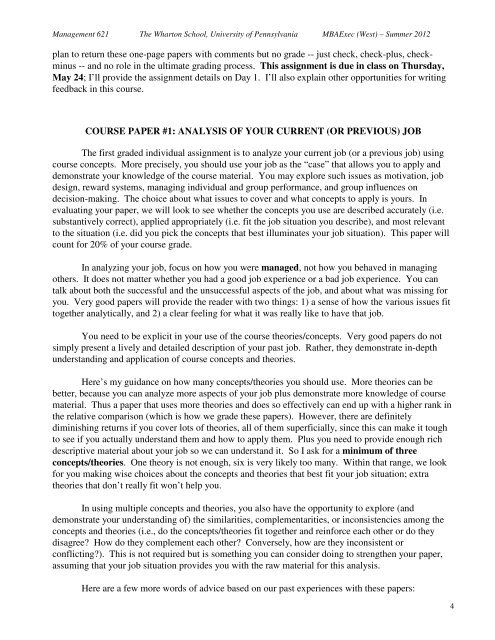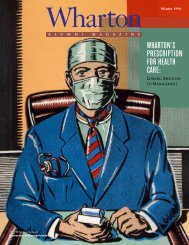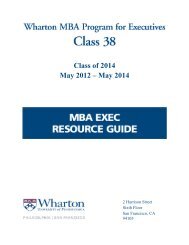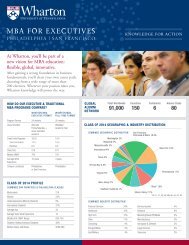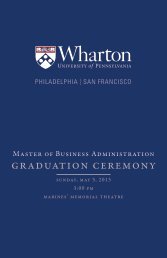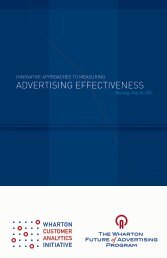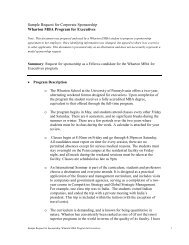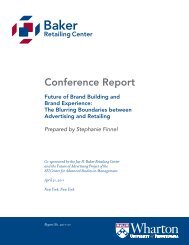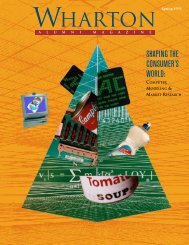version Date: April - The Wharton School of the University of ...
version Date: April - The Wharton School of the University of ...
version Date: April - The Wharton School of the University of ...
You also want an ePaper? Increase the reach of your titles
YUMPU automatically turns print PDFs into web optimized ePapers that Google loves.
Management 621 <strong>The</strong> <strong>Wharton</strong> <strong>School</strong>, <strong>University</strong> <strong>of</strong> Pennsylvania MBAExec (West) – Summer 2012<br />
plan to return <strong>the</strong>se one-page papers with comments but no grade -- just check, check-plus, checkminus<br />
-- and no role in <strong>the</strong> ultimate grading process. This assignment is due in class on Thursday,<br />
May 24; I’ll provide <strong>the</strong> assignment details on Day 1. I’ll also explain o<strong>the</strong>r opportunities for writing<br />
feedback in this course.<br />
COURSE PAPER #1: ANALYSIS OF YOUR CURRENT (OR PREVIOUS) JOB<br />
<strong>The</strong> first graded individual assignment is to analyze your current job (or a previous job) using<br />
course concepts. More precisely, you should use your job as <strong>the</strong> “case” that allows you to apply and<br />
demonstrate your knowledge <strong>of</strong> <strong>the</strong> course material. You may explore such issues as motivation, job<br />
design, reward systems, managing individual and group performance, and group influences on<br />
decision-making. <strong>The</strong> choice about what issues to cover and what concepts to apply is yours. In<br />
evaluating your paper, we will look to see whe<strong>the</strong>r <strong>the</strong> concepts you use are described accurately (i.e.<br />
substantively correct), applied appropriately (i.e. fit <strong>the</strong> job situation you describe), and most relevant<br />
to <strong>the</strong> situation (i.e. did you pick <strong>the</strong> concepts that best illuminates your job situation). This paper will<br />
count for 20% <strong>of</strong> your course grade.<br />
In analyzing your job, focus on how you were managed, not how you behaved in managing<br />
o<strong>the</strong>rs. It does not matter whe<strong>the</strong>r you had a good job experience or a bad job experience. You can<br />
talk about both <strong>the</strong> successful and <strong>the</strong> unsuccessful aspects <strong>of</strong> <strong>the</strong> job, and about what was missing for<br />
you. Very good papers will provide <strong>the</strong> reader with two things: 1) a sense <strong>of</strong> how <strong>the</strong> various issues fit<br />
toge<strong>the</strong>r analytically, and 2) a clear feeling for what it was really like to have that job.<br />
You need to be explicit in your use <strong>of</strong> <strong>the</strong> course <strong>the</strong>ories/concepts. Very good papers do not<br />
simply present a lively and detailed description <strong>of</strong> your past job. Ra<strong>the</strong>r, <strong>the</strong>y demonstrate in-depth<br />
understanding and application <strong>of</strong> course concepts and <strong>the</strong>ories.<br />
Here’s my guidance on how many concepts/<strong>the</strong>ories you should use. More <strong>the</strong>ories can be<br />
better, because you can analyze more aspects <strong>of</strong> your job plus demonstrate more knowledge <strong>of</strong> course<br />
material. Thus a paper that uses more <strong>the</strong>ories and does so effectively can end up with a higher rank in<br />
<strong>the</strong> relative comparison (which is how we grade <strong>the</strong>se papers). However, <strong>the</strong>re are definitely<br />
diminishing returns if you cover lots <strong>of</strong> <strong>the</strong>ories, all <strong>of</strong> <strong>the</strong>m superficially, since this can make it tough<br />
to see if you actually understand <strong>the</strong>m and how to apply <strong>the</strong>m. Plus you need to provide enough rich<br />
descriptive material about your job so we can understand it. So I ask for a minimum <strong>of</strong> three<br />
concepts/<strong>the</strong>ories. One <strong>the</strong>ory is not enough, six is very likely too many. Within that range, we look<br />
for you making wise choices about <strong>the</strong> concepts and <strong>the</strong>ories that best fit your job situation; extra<br />
<strong>the</strong>ories that don’t really fit won’t help you.<br />
In using multiple concepts and <strong>the</strong>ories, you also have <strong>the</strong> opportunity to explore (and<br />
demonstrate your understanding <strong>of</strong>) <strong>the</strong> similarities, complementarities, or inconsistencies among <strong>the</strong><br />
concepts and <strong>the</strong>ories (i.e., do <strong>the</strong> concepts/<strong>the</strong>ories fit toge<strong>the</strong>r and reinforce each o<strong>the</strong>r or do <strong>the</strong>y<br />
disagree How do <strong>the</strong>y complement each o<strong>the</strong>r Conversely, how are <strong>the</strong>y inconsistent or<br />
conflicting). This is not required but is something you can consider doing to streng<strong>the</strong>n your paper,<br />
assuming that your job situation provides you with <strong>the</strong> raw material for this analysis.<br />
Here are a few more words <strong>of</strong> advice based on our past experiences with <strong>the</strong>se papers:<br />
4


